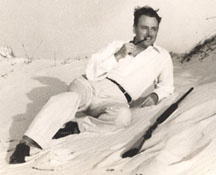 This Goodly Land
This Goodly Land
Hudson Strode (October 31, 1892–September 22, 1976)

Other Names Used
- Eugene Hudson Strode: full name
Alabama Connections
- Demopolis, Marengo County: childhood residence
- Tuscaloosa, Tuscaloosa County: education, adult residence
Selected Works
- Strode, Hudson. The Story of Bermuda. New York: H. Smith and R. Haas, 1932.
- Strode, Hudson. South by Thunderbird. New York: Random House, 1937.
- Strode, Hudson. Finland Forever. New York: Harcourt, Brace and Co., 1941.
- Strode, Hudson. Jefferson Davis: American Patriot, 1808-1861. New York: Harcourt, Brace, 1955.
- Strode, Hudson. Jefferson Davis: Confederate President. New York: Harcourt, Brace and Company, 1959.
- Strode, Hudson. Jefferson Davis: Tragic Hero. The Last Twenty-Five Years, 1864-1889. New York: Harcourt, Brace & World, 1964.
- Strode, Hudson. The Eleventh House: Memoirs. New York: Harcourt Brace Jovanovich, 1975.
Literary Awards
- One of two prizes for best unpublished play, National Little Theatre Tournament, New York, 1929, for The End of the Dance
- Alabama Author Award, Alabama Library Association, 1960
Biographical Information
Hudson Strode was born in Cairo, Ill. The family soon moved to Denver, Colo., and, after his father’s death, to Kentucky, where Strode’s mother taught at Clinton College. Strode’s mother remarried, and the family moved to Demopolis, Ala. As a boy, Strode was interested in drama, acting in school plays and attending professional performances. He graduated from high school at age sixteen and enrolled at the University of Alabama, where his interest in drama continued. Strode earned his AB in English literature in 1913 and went to New York City, where he received an MA from Columbia University in 1914. Strode spent two years as an English instructor at Syracuse University. During this period, he sold his first short story to McClure’s Magazine. In 1916, Strode returned to the University of Alabama to teach English literature and public speaking. Ineligible for the draft because he was underweight, Strode spent World War I arranging troop entertainments. After the war, he returned to the University of Alabama. In addition to his teaching duties, Strode was also directing plays, giving lectures and dramatic readings, and writing. His health began to suffer, and he had a nervous breakdown in the summer of 1926. After recuperating at a friend’s home for several months, Strode returned to work. He spent the summers of 1927 and 1928 at the MacDowell Colony, writing poems, book reviews, and a one-act play.
Strode suffered another breakdown in 1929, and he and his wife went to live in Bermuda so that he could recover his health. When they returned to Alabama in 1932, Strode published The Story of Bermuda, the first of a series of travel books he published in the 1930s and 1940s. In 1936, a request from one of his students, Harriet Hassell, prompted Strode to offer a fiction-writing class at the University of Alabama, which he continued to teach for twenty-five years. Many of his students won national writing competitions and, with Strode's assistance, found publishers for their short stories and novels. In the 1950s, Strode began working on a three-volume biography of Jefferson Davis. This work was published over a nine-year period and was generally well-received, although some reviewers questioned his sympathetic tone toward his subject. In 1961, Strode was made a Knight of the Royal Order of the North Star by King Gustav Adolf of Sweden in appreciation of his writings about Scandinavia. Strode retired from teaching in 1963. He continued to write and published another travel book in 1970 and a memoir in 1975.
Interests and Themes
Hudson Strode’s travel books discuss the history, geography, and culture of the countries profiled. At the time of its publication, his biography of Jefferson Davis was considered by some to be the definitive biography of the President of the Confederacy.
For More Information
Please check your local library for these materials. If items are not available locally, your librarian can help you borrow them through the InterLibrary Loan program. Your librarian can also help you find other information about this author.
There may be more information available through the databases in the Alabama Virtual Library. If you are an Alabama citizen, AVL can be used at your public library or school library media center. You can also get a username and password from your librarian to use AVL at home.
Reference Articles
- Rountree, Thomas J. "Hudson Strode: The Legend and the Legacy". Alabama English Spr. 1990: 16-24.
Reference Book Chapters and Encyclopedia Entries
- Greenhaw, Wayne. "Learning to Swim"; The Remembered Gate: Memoirs by Alabama Writers. Ed. Jay Lamar and Jeanie Thompson. Tuscaloosa: University of Alabama Press, . 96-110.
Reference Web Sites
- Kaetz, James P. "Hudson Strode". The Encyclopedia of Alabama. 2009. Alabama Humanities Foundation and Auburn University. http://www.encyclopediaofalabama.org/face/Article.jsp?id=h-2485.
Location of Papers
- University of Alabama
Photo courtesy of the W. S. Hoole Special Collections Library, The University of Alabama.
Last updated on May 30, 2008.